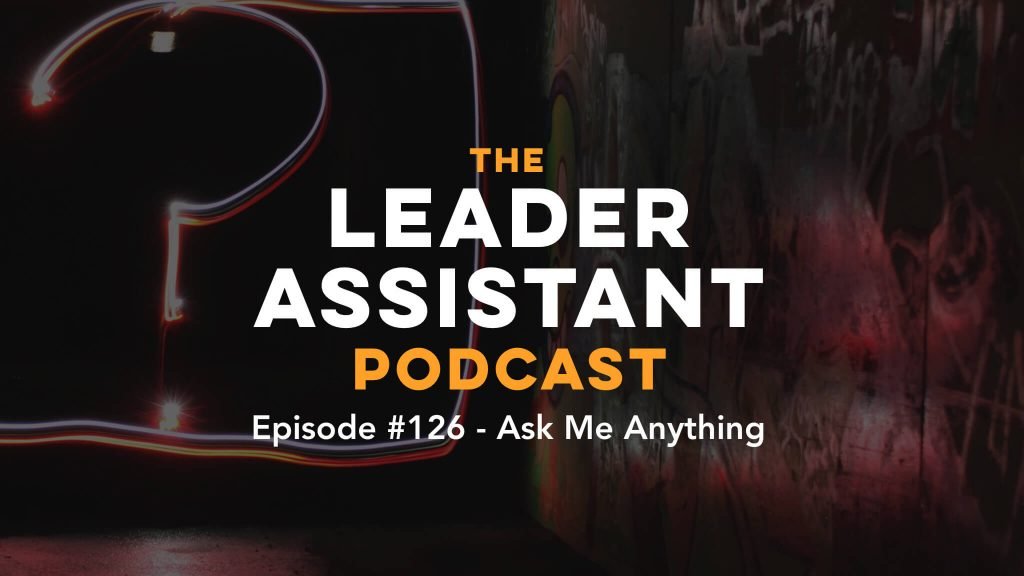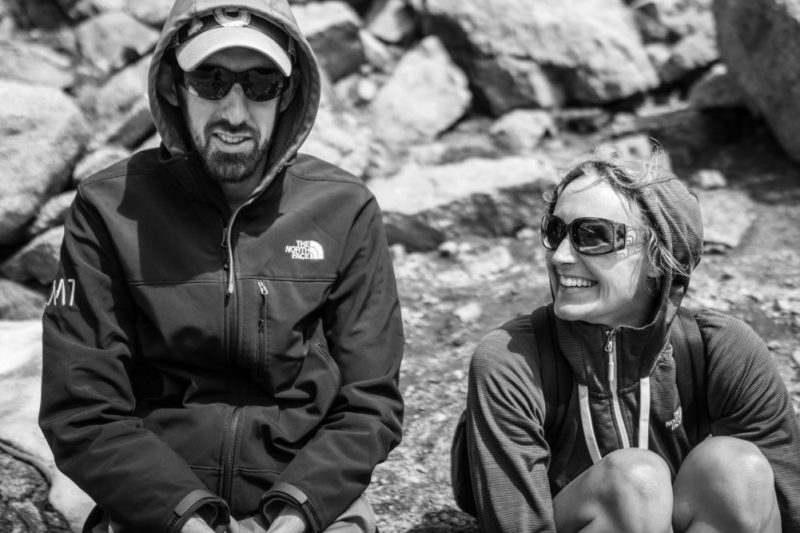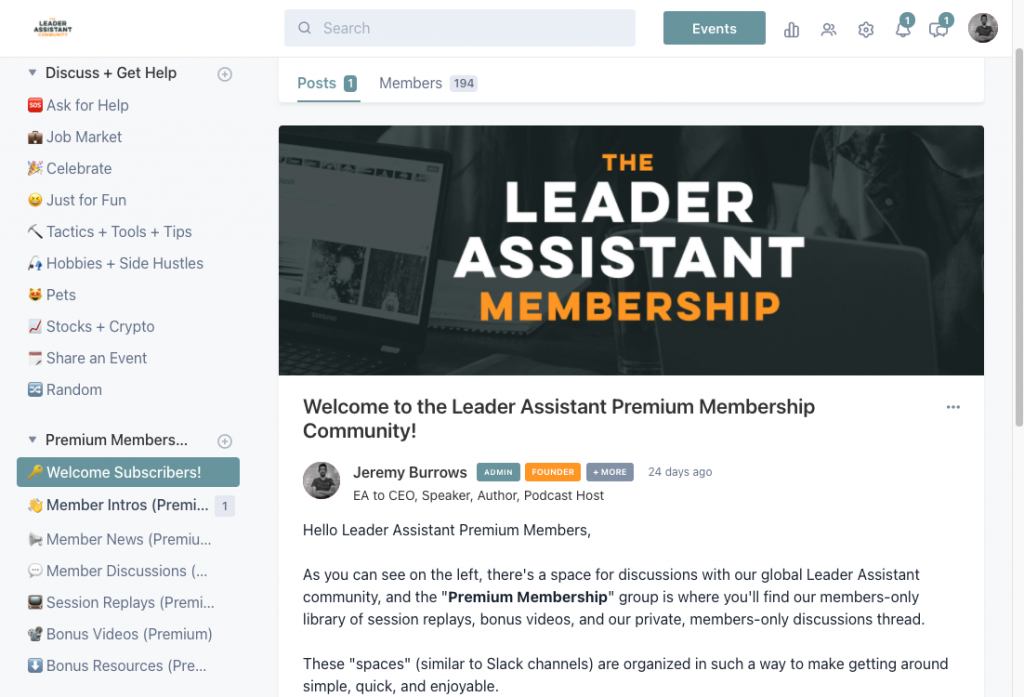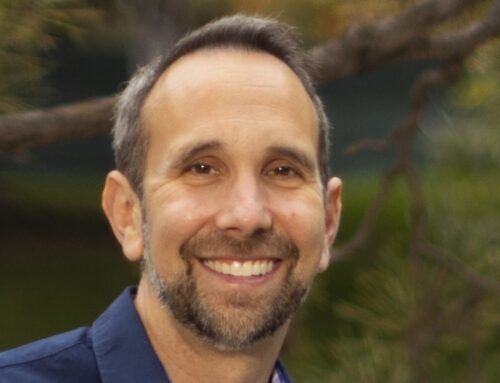
In this Ask Me Anything episode of The Leader Assistant Podcast, I do my best to answer the following questions about my book from assistants all over the world:
- How do you handle negative reviews about your book?
- How long did it take you to write the book and what kind of hurdles did you experience during the process?
- In hindsight, is there anything that you wished you would have added to your book?
- How much money did it cost you to publish The Leader Assistant?
- What if an executive does NOT have clear KPIs (discussed in chapter 15 of the book) for the first 30-60-90 days for their new EA hire? What does this say about the executive or the organization?
- You recommend a one-page resume in chapter 17 of your book. How does this stay current with the times that most HR professionals now I’ve conferred with on LinkedIn have said up to 2 pages is perfectly acceptable?
Enjoy!
-Jeremy Burrows
CONNECT WITH ME
- My LinkedIn
- The Leader Assistant: Four Pillars of a Confident, Game-Changing Assistant
- Ask a question for a future episode by emailing me at podcast@leaderassistant.com
ABOUT ME
I’m a longtime executive assistant, international speaker and trainer, founder of The Leader Assistant Community and Premium Membership, author of the #1 Amazon Bestselling book, The Leader Assistant: Four Pillars of a Confident, Game-Changing Assistant, and host of the #1 podcast for assistants – The Leader Assistant Podcast.
I’ve worked with CEOs, professional athletes, Fortune 100 board members, billionaires, pastors—and their assistants—in both the nonprofit and for-profit sectors.
I’ve also had the opportunity to speak at administrative professional and executive assistant conferences all over the world, including Hong Kong, Thailand, and Germany.
I’m currently EA to the Founder and CEO of Capacity, a fast-growing artificial intelligence SaaS startup with an AI-powered, support automation platform.
My passion is to help you lead well, resist burnout, and automate before you’re automated.
I live in Kansas City, MO with my amazing wife and 2 boys. My hobbies are podcasting, beer, music, stocks, and entrepreneurship.
THE LEADER ASSISTANT PREMIUM MEMBERSHIP
To learn more about how you can join the now 200+ growth-minded Leader Assistants, check out our Leader Assistant Premium Membership for ongoing training, coaching, and community.
LEADER ASSISTANT LIVE EVENTS
Check out our constantly updated schedule of events for admins and assistants at LeaderAssistantLive.com.
THE LEADER ASSISTANT BOOK
Download the first 3 chapters of The Leader Assistant: Four Pillars of Game-Changing Assistant for FREE here or buy it on Amazon or Audible.
JOIN THE FREE COMMUNITY
Join the Leader Assistant Global Community here, or the Facebook Group here for bonus content and to network with other assistants who are committed to becoming leaders!
SUBSCRIBE
Subscribe to The Leader Assistant Podcast so you don’t miss new episodes!
You can find the show on Apple Podcasts, Spotify, Google Podcasts, Pandora, and Stitcher.
Join my email list here if you want to get an email when a new episode goes live.
LEAVE A REVIEW
If you’re enjoying the podcast, please take 2 minutes to rate and review the show on Apple Podcasts here. Each review helps me stay motivated to keep the show going!
—
EPISODE TRANSCRIPT
Podcast Intro 0:03
The Leader Assistant Podcast exists to encourage and challenge assistants to become confident game changing leader assistants.
Jeremy Burrows 0:14
Hey, friends, welcome to episode 126 of The Leader Assistant Podcast. It’s your host, Jeremy Burrows. And I am excited for another Ask me anything. Episode This one is asked me anything about the book, there are lots and lots of questions that I’ve received over the last year or so about the leader assistant book, which is on Amazon at Amazon.leaderassistant.com. If you haven’t checked it out yet, I encourage you to definitely check it out. Let me know what you think. But yeah, these are some questions that people have submitted over the last year or so. And these are all pretty much anonymous, because I just got them so many times and just wanted to answer them. So. So thanks for your support. On the book. It’s the number one Amazon Best Seller, multiple categories. And it’s been such a fun ride and a well received book. And I’m most excited about the impact that it’s made on your careers, and your partnerships with your executives and on your confidence in helping you avoid and resist burnout. So yeah, this is going to be asked Me Anything session about the book. So first question is how do you handle negative reviews about your book. Now this is a good one, I’m actually going to share a negative review. I don’t know if you all have seen those clips where celebrities are reading tweets that trolls or people that don’t like them have tweeted to them. It’s pretty funny, I love it because it one it reminds you that you’re human, everybody’s human, and that we should be kinder to people to it shows that these celebrities are willing to have fun, and not take things personally and just are confident enough in themselves to participate in something like that. So I wanted to have a little fun. And I wanted to read one of the negative reviews in this episode, and then talk about how I handle them. So this one is one star review from February. And the title of the review is do not recommend. So that’s a you know, that’s probably why they rated at one star because they don’t really recommend it. It’s from the United States. A user Amazon account named Flossie, May, so hi, Flossie may or whoever you are, and wherever you are, thanks for taking time to check out the book, even though if you didn’t like it. The review says I did not enjoy this book. Jeremy has a bigger budget and more authority than a ministerial assistant. Hard to relate to. So that’s one of the negative reviews, one star review. Again, I appreciate anybody leaving reviews, even if they’re negative just because it shows that people actually tried the book out and checked it out. And if it’s not for philosophy may it’s not for Fossey may so But what’s interesting is, you know, to answer this question, how do you handle negative reviews? Well, this one was interesting, for a couple of reasons. And the kind of big picture, high level way that I try to handle them is to just not take them personally not to attach my worth to the reviews. So like if I get a one star review, I do my best to not get depressed and real. And remember that it just just must not have been for them. And that’s okay, this this book is not for everyone. But I also tried to really put myself in the shoes of the reviewer, and try to understand why it didn’t connect with them. Because I’m always about growing. I’m always about trying to take feedback and get better and better and better. So this one’s interesting because says first it says Jeremy has a bigger budget than a ministerial assistant, a ministerial assistant is typically a pastor’s assistant, somebody in ministry in a nonprofit in a church, which the kind of ironic thing is I was a ministerial assistant for 12 years. So I worked at a nonprofit with a lower budget and, you know, all that kind of stuff. So I know what it’s like to be ministerial assistant, because that was my first foray into the EA world. And then, you know, they say it was hard to relate to. So I totally understand And that beat Now that I’m in the corporate world, or maybe because I was even in a large, large church, I was in a large nonprofit. Compared to most churches in the state of Missouri, for example, we were one of the biggest churches in the state of Missouri. And there’s, there’s just putting myself in the reviewers shoes, I’m like, okay, they, they just can’t relate. And that’s totally fine. But I’m also taking it as, okay. There might be some other issues where they don’t feel they have the authority, and they don’t feel they have chance or hope to ever get that that leadership or that strategic authority that they see that I have. And that’s part of why I wrote the book is to hopefully encourage people like like this, this reviewer, to see that even in their smaller, or, you know, lower budget context, there’s still leadership traits that you can exhibit, and they’re still impact that you can make. So, again, I try to take these negative reviews, I try to think about, okay, what are they really saying, if they’re really saying anything, and oftentimes, it’s not helpful at all, oftentimes, there’s no feedback in it, that’s actually helpful. They just clearly clearly missed the mark. And there’s nothing I can do about it. And it’s not about me trying to do something. It’s about me trying to learn and grow. And then also reminding myself that I’m a valuable human being no matter what a negative review, negative review says. So we’ll talk about that a little bit more in the next episode, when I’m going to talk about that, I’m going to answer questions related to the podcast, and I’ve got some negative reviews on the podcast, too. And I’ll actually share a little bit more about how I’ve learned from those as well. So the next question is, regarding the book is, how long did it take you to write the book? And what kind of hurdles did you experience during the process? So it took me I mean, ultimately, I’d like to say it took me four years because I started blogging, four years before I published the book. And a lot of the writing that I had done was either was really a start a draft of the book. And so I had a lot of practice, I had a lot of writing built up. But when from the time that I actually said, Alright, I’m gonna sit down and write a book, I’m gonna figure out the outline, I’m actually going to do this. Till the time that I published it, it was probably, let’s see, I think it was in maybe September or October. So then November, December, January, February, March, April, May June, do my math, it’s about six to eight months. Now, it was done, though, about two or three months before it published, it was a long process. So once I was actually done writing it, it still had a couple three months to before it published. So really, the sit down in writing it portion was probably more like five or six months, overall. So as far as what kind of hurdles did I experience? quite a quite a few. But the first or the biggest one I would say, is just emotionally it was very draining, it was very vulnerable to write down my some of my story, lots of personal stuff that I shared, in my experience, and some of the mistakes I made and some of the stuff that was my family and all that. And that was really, really challenging and emotional to really wrestle with all that. But really, it was about, okay, I’m going to publish this book, and people are going to not just know me, but they’re going to either accept it or reject it. And I just really had to wrestle with Okay, is, is anybody going to really enjoy this? Is this actually going to be helpful? am I wasting my time, all those kinds of doubts that you can imagine, come up anytime you try to create something or even anytime you try to present a proposal or, or a slide deck? You know, all those thoughts came up and those fears and those anxieties kind of came to the surface. So next question is, in hindsight, is there anything that you wished you would have added to your book? So I put a lot in there. I would say there’s times where I went more at a surface level instead of really digging in and going as deep as I would have liked to so that I probably would have liked to go deeper in a few areas. However, I am happy with how it turned out. And I’m glad that I went broad and really tried to cover everything so that it could kind of be A Guide for assistance. But the one thing that I wish I could have added, but it really wasn’t good timing, honestly. But I wish I would have added a chapter on working remotely.
Now I actually do work full time remote, I moved across the state and I live in Kansas City, my company’s in St. Louis, my executives in St. Louis. So I actually have more experience. And that’s happened since after the the book was published. But I had worked from home often on here and there. And so I had a little bit, but I just didn’t feel like I had a lot of experience. And the pandemic, when I was done with the book, the pandemic hadn’t really started yet. By the time it had published it, obviously, it was in the middle of the COVID 19 pandemic. But the remote stuff wasn’t, I guess, as crazy in the front of everybody’s mind, as it was two months after I submitted the manuscript. So anyway, I think that, at some point, I’d love to maybe do a revision and add remote working chapter in the book. But we’ll see, we’ll see. Another question is, How much money did it cost you to publish the book. So I know exactly how much money it cost me to publish the book. This doesn’t mean that it’s going to cost this much for you, if you decide to write a book, I hired a few different people. And I’ll kind of walk through that real quick. So I hired a self publishing partner. So it’s kind of in the middle of kind of a middle ground as far as I didn’t have a publishing company deal and like, publish my book. And I also didn’t just self publish it all on my own. So I kind of had a partner that I worked with was kind of in between self publishing partner to publish the leader assistant. And they helped me you know, that that fee, there fee was pretty pricey. But that included graphic design on the interior of the book, also the cover, exterior design for the hardcover and the paperback and audiobook, you know, image and all that kind of stuff. And then it also covered some editing and proofreading it covered setting up all the Amazon ISBN numbers and giving me guidance on the audiobook. And really just holding my hand throughout the process and saying, Alright, for the next 30 days is what you need to focus on. This is what you need to focus on, then these are the these are the key dates, etc. So I spent money on that I also was really felt really strongly about doing the audiobook myself recording it myself, but I really, I knew is going to be a lot of work to read it and be be the voice of the audiobook that I didn’t want to put all the extra work on top of that to recording it and editing it myself. So I actually hired a audio producer, and went into a professional studio to record the book and have them edit it and master it. So that it would be one so they’d be well done and professional but to so that I could actually just focus on spending 10 hours in the studio reading my book nonstop. So that was that was fun that was actually did it over three sessions. But it was a long process. And then I also hired a an additional copy editor to go line by line and just tear it up. Make sure things flow from one thing to another from one chapter to another. Make make sure there’s you know, it’s grammatically correct. Check for typos, all that kind of stuff. But really just delete, delete, delete all the excess and make it as good as it could possibly be. So I paid a copy editor do that as well. And then there are a few small like software purchases, I use a software called Scrivener to actually write the book. It’s it helped me focus and organize the book. Much, much better than like Google Docs or Microsoft Word. But yeah, so total, my total book expenses. And this is a big investment for my family. super thankful for my wife being open to doing this, and supportive throughout the whole process. In fact, she did a ton of editing and a ton of review and really gave me a lot of good feedback and said yeah, you shouldn’t say this here, this is going to offend people or you shouldn’t do this because it’s going to not make sense or people aren’t going to relate or you know, she helped a ton. So I’m very, very thankful for her perspective and in sight and making the book better. But the total expense was $19,692.59. So just under $20,000 investment for the book. So, again, I didn’t want to, you know, half ass it, if you will, I wanted to do a very professional book with a very professional cover that didn’t have a bunch of typos, that looked good. Because this is a big project. And I thought, if I’m gonna do this, I want to do it right. And so we invested that money in this in this process. And I’m very, very thankful and very blessed that I even could do that, that I didn’t have to, you know, take a bunch of credit card debt on just to pay for it. And just to do this, and then ultimately, it took less than I thought it would be less time than I thought it would to make that money back. And so thanks to all your support, and the feedback on the book has just been just mostly positive. And it’s helped so many people, that thankfully, I was able to make my money back in. Like, I think it was like six months or something, I was able to make the money back through pre sales, and you know, just Amazon sales and whatnot. And, yeah, it’s been a huge, it was huge investment. And so what I wanted to say about this, though, is, if you’re thinking about writing a book, you don’t have to spend $20,000. Okay, don’t let that be your kind of roadblock. To do this, if you really want to do it, you can do it. I know other authors that have done it for 5000. I know other authors that have done it for 10,000, I, you know, I know you can make it work, you can do it depending on how much you want to do yourself, depending on how much your editor is, if you want to do an editor at all, you know, depending on how much the book cover is and how much help you want along the process and along the way. But I will say though, if you are thinking about writing a book, The best advice that I ever got, and this is exactly what I followed. The three or four years leading up to when I actually sat down and wrote wrote the book was from Seth Godin, I was listening to him on a podcast, and he said, you know, people come up to me, he’s a marketing guy. And he’s like, people come up to me. And they say, Hey, Seth, I’ve been writing this book for the last three or four years. And I think it’s ready, I think I’m ready to share it with the world. What do you recommend? I do? How do I get this out there? And he his answer to those people was essentially this, you’ve been doing it all wrong. You should have been getting your ideas out into the world for the last three to four years. And that’s what you should spend your time on. And then you could come to me and say, Hey, I’ve been putting my ideas out into the world to see which ones stick, see which ones are helpful. Growing my reach and my audience and my email list. And now I’m ready to write a book. And it was just the simplest thing I heard in a podcast while I was mowing my yard. And I was just like, man, that makes so much sense. That’s what I’m going to do. So that’s what I did. I spent three to four years, blogging and coaching and speaking and doing all of this LinkedIn outreach and LinkedIn posts and just sharing my ideas and just really got a lot of feedback from you all on what was sticking, what wasn’t sticking what what was helpful, what wasn’t. And that really, honestly, I think that’s why the book has been so successful. Because these ideas and tactics and tips that I put in the book, are not just something that just came straight from my crazy brain and onto the page. They went through a rigorous three or four year process of inventing by you all my readers and listeners and, and followers. And so yeah, thanks for reading all my stuff over the years and sharing what what impacts you and letting me know
what was helpful. So anyway, that’s, that’s kind of my answer on that. It was an expensive investment. But investing in yourself is one of the best ways to invest in my opinion, and it worked out thankfully. So hopefully, that’s helpful. Hopefully, that’s encouraging. If you are looking at doing that, please feel free to ping me. I’m constantly coaching other assistants or even just authors on The whole process and how to write a book and sell a number one Amazon bestseller. I just share all the things that have helped me. So yeah, ping me if you’re interested in that. I do want to wrap up real quick with two quick questions from specific chapters in the book that somebody sent me. One was from Chapter fifth teen, which is about goal setting. And it says, the question is, what if your executive does not have clear KPIs for the first 30 to 60 days for their new EA that they’ve hired? What does that say about the executive or the organization? And this person was asking because they’ve had a recent interview where they asked a question like this, and the executive director, basically said, Well, you just got to manage different personalities. And she was trying to figure out, okay, is this a sign that the executive and the organization is not a good place to work? What is it? What is the say, if they don’t have clear key performance indicators, or OKRs, which are objectives and key results for the first 3060 90 days for that hire, and I would just say, it depends. Sometimes that could mean yes, it’s not a good organization work for them. They’re not very organized, they don’t have their priorities, they don’t have a good systems and structure. But sometimes that just means they need a really, really good EA to come in and run that and self manage, which most EAS honestly are self managed. And we have to manage our own KPIs. And we have to manage our own goals. And this could be a huge win, because you could come in and freakin own it, and come up with those 90 Day goals. say, Listen, this is what I want to happen the first 90 days of my when I work with this executive at this new company, so very, very hard to answer that without knowing all the rest of the context. But that’s my, my quick attempt. And then the last question was about chapter 17, which is on resumes. That’s called the perfect resume. And she asked you recommend a one page resume? How does this stay current with the times when most HR professionals that I’ve, you know, interacted with on LinkedIn have said up to two pages is perfectly acceptable. And what I would say is, up to two pages, sure, that’s totally acceptable. But if you want your resume to stand out, if you want people to actually read it, keep it to one page, and go to leaderassistant.com/resumetips, that’s leaderassistant.com/resumetips, or read chapter 17 of the leader system book. And you’ll you’ll kind of get some good resume tips, but keep it one page. I mean, there’s plenty of things that you can leave off, that you can shorten, you know, even changing the font size just a little bit, keep it to one page, you’ll have a better chance of them reviewing and getting you that phone call, in my opinion. So. All right. Well, thanks for listening. Hopefully, that was helpful. Thanks again for your support on the book. You can check it out on Amazon Amazon.leaderassistant.com And next week’s episode is asked me anything about the podcast so I’m gonna answer some questions about the podcast that you’re listening to right now. So talk to you next time.
Unknown Speaker 23:33
Thank you for being a leader.
Unknown Speaker 23:47
Please love you on Apple podcasts. Goburrows.com







